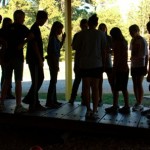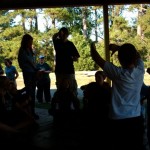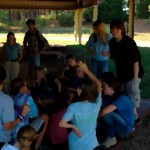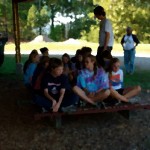One of the first things we learned at Heifer was the process of group formation. It was also one of the last things they talked about so it must have been pretty important.
The four steps are:
- Forming: When the group first gets together, people tend to be cautious with one another. But because they’re so careful with what they say and what they do, newly forming groups don’t usually get much done.
- Storming: Now the barriers start to break down as individual personalities manifest themselves. People start speaking up. A lot. They become less polite. Conflicts arise. People become accusatory. There’s lots of energy, but because of all the conflict, they still aren’t able to get much done.
- Norming: The conflict begins to settle down as the group starts to work out its kinks, as all the individuals begin to adapt to one another. Groups may need guidance to get there because everyone has to stop fighting, but as it usually helps that the group will start to see successes because of successful co-operation.
- Performing: A well-functioning group can get a lot done. They’re able to communicate effectively, and take action effectively. Their productivity kicks into high gear and they can accomplish much together.



Not all groups get through all four steps, and every time the group changes, such as when a new member (like a new student) is introduced the groups will need to go through some version of the four steps as they learn to accommodate the newcomer.
A well established culture will help groups adapt to change. This is yet another benefit of multi-aged classrooms, because a healthy classroom culture eases the transition as older students leave and new students come in.

Even so, awareness of the four steps is extremely useful because it helps everyone anticipate that there will likely be some conflict, but that conflict is part of the group forming process and will likely diminish with time.
So you should expect, every year, to have to spend some time group building. Two weeks dedicated to orientation and teamwork is what Betsy Coe’s Montessori Middle School program uses. It’s a fair chunk of time to take out of the year, but because good groups can get so much more done, it’s well worth it to build a good classroom community.